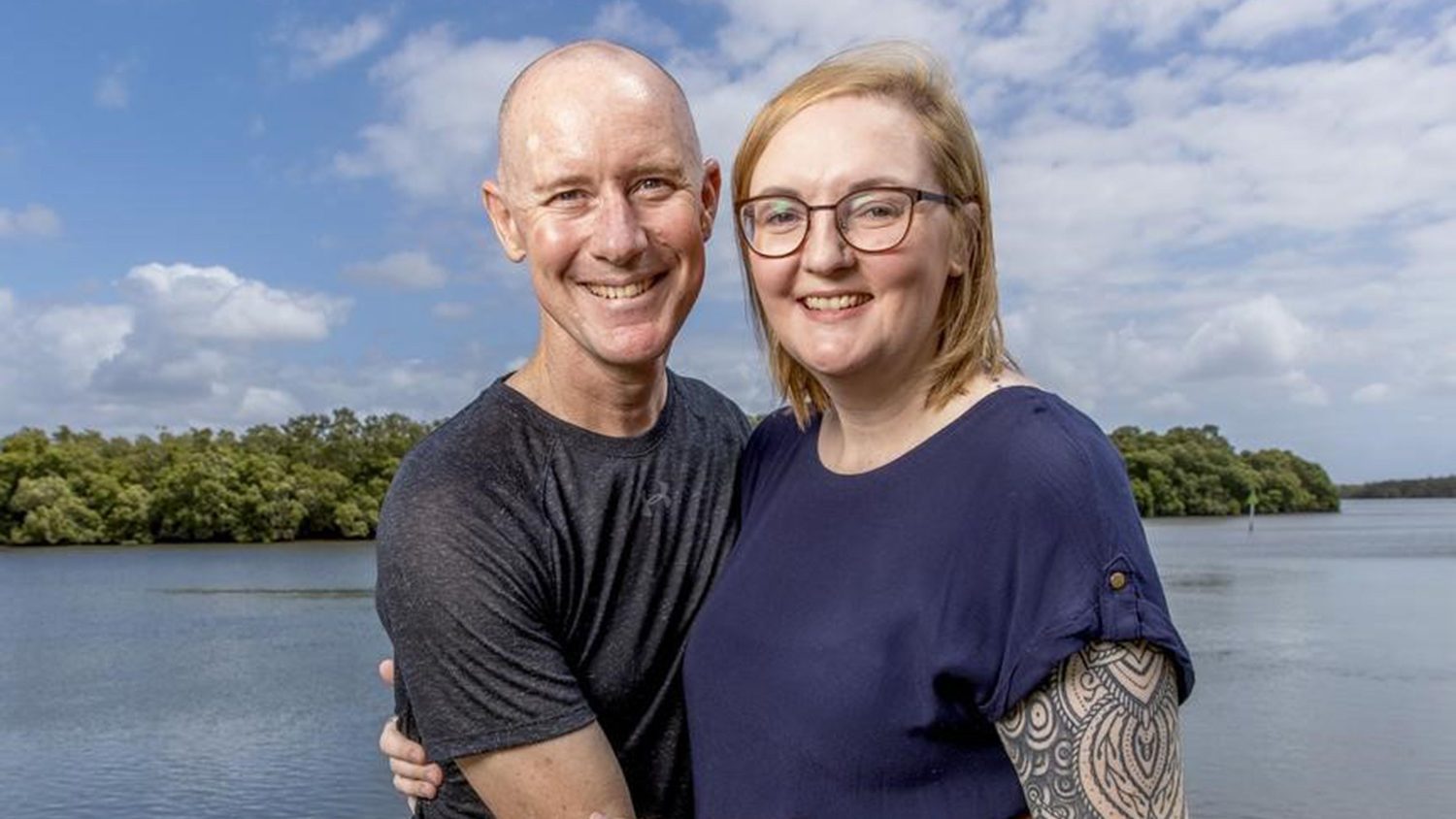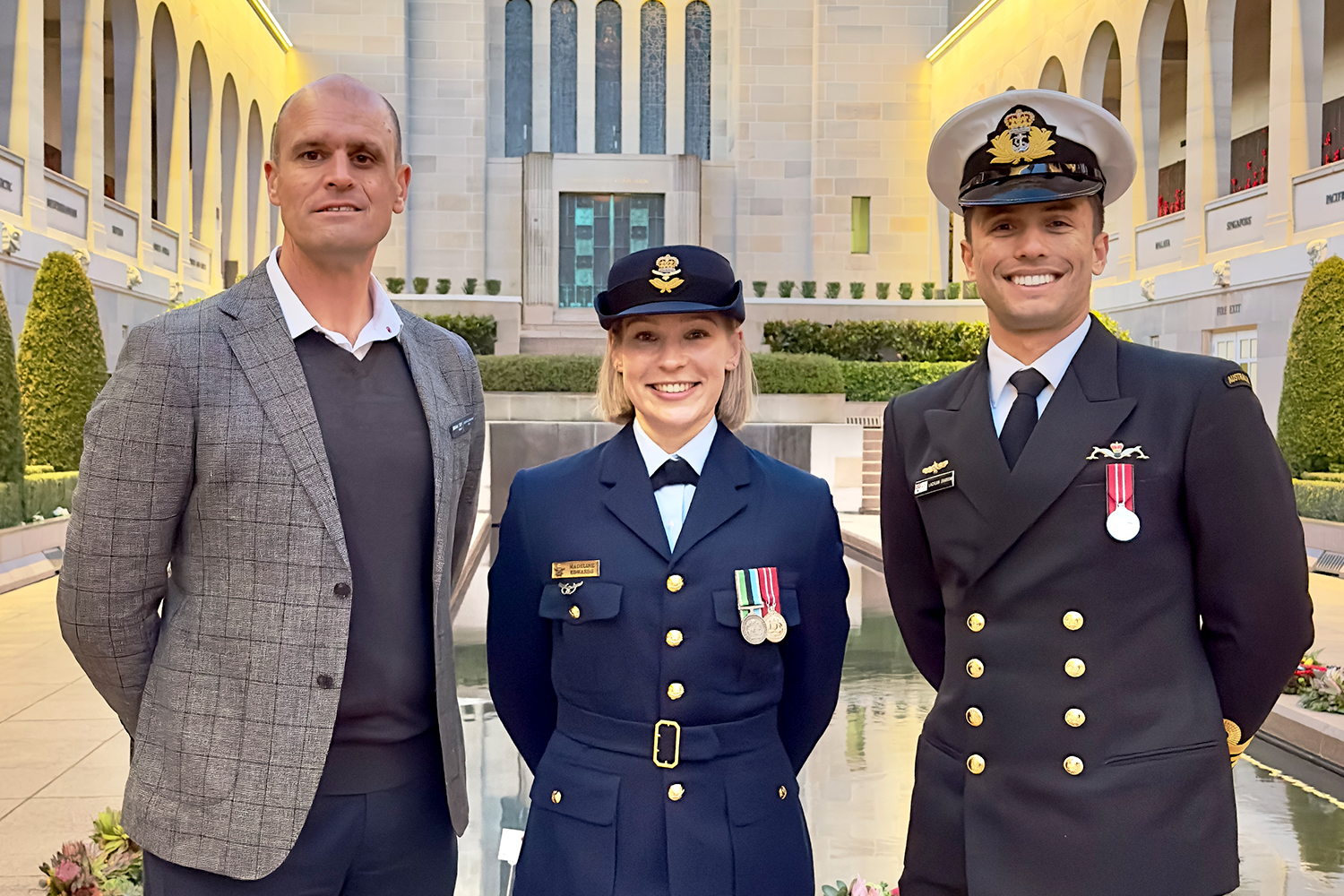Family’s special trek across Brisbane…
They have travelled thousands of kilometres across the world battling to hold their young children for the first time and working amid civil unrest. But this Brisbane family is now facing another huge battle.
Story from: Quest Newspapers / Brisbane Courier Mail
Date: November 23, 2020 9:36am
Written by: Kara Sonter
Images by: Richard Walker
Emma Clement-Wriede and Bruce Wriede have shared an amazing life — they both worked in Middle East amid civil unrest, waged a three-year battle to hold her their children for the first time, and moved around the world for the little ones they loved.
But despite all the miles across the globe, a simple walk around Brisbane is proving just as important.
The north Brisbane pair is currently facing their biggest battle of all as Bruce, an Australian Air Force veteran, faces a heartbreaking cancer diagnosis.
Desert Meeting
British citizen Emma and Queenslander Bruce may have a love story like no others. “We were both living in Kuwait. I was there teaching and Bruce was there as a civil contractor,” Emma said. “We met paintballing in the middle of a desert. That was kind of it… we sort of couldn’t be separated. Bruce is very laid back, I always used to say he’s a typical Australian. My to-do list always has a million things on it… he is my calm, he is my Zen, he is my peace. In that way we are the perfect balance.”
Six months later the pair was married and had dreams of starting a family.
For the ones they love
In 2013 from their home in Kuwait, the couple started the process of adopting their children Grace and Joseph, from the Democratic Republic of the Congo.
“That took some time,” Emma said. While the adoption process was officially complete by 2014, it took another two years for the parents to hold their children for the first time. Political complications at the time prevented children adopted by international families to leave the country. And so began an advocacy journey.
“It was quite unsavoury,” Emma said. “It wasn’t a pleasant time.”
About 1000 adopted children were delayed from reaching their new families during that time, with Emma and Bruce’s children among the last to be released from the country.
“Advocating to bring those children home became my full time job. “It was tumultuous.”
However by the time Grace and Joseph were finally allowed to leave their country, unrest in Kuwait meant entry laws for those travelling from parts of Africa had changed and it prevented the children from attaining Visas.
“We had to find somewhere safe for all of us.”
So the family chose a small unit in the Philippines — a country Emma had visited before and one that would allow the children to enter. The children’s escorted arrival into the country would be the first time they would come face to face with their parents — their first touch, their first hug. Emma — who specialises in working with children with high needs — said the pair made the decision not to meet the children in person before the day they could take them home, so that once the children met them they would never have to leave.
“It was one of those things I knew, and Bruce definitely knew, is that I wouldn’t be leaving without them. Bruce knew he would be leaving (Africa) alone.”
Instead, the couple created visual story books for the children with photos of them, their home, their garden and their pets and spent hours on Skype calls. However while Emma finally greeted the children, Bruce was in the departures lounge on his way back to Kuwait for surgery following a cancer diagnosis.

Shock diagnosis
“He was diagnosed with stage two melanoma, which was just a small growth in his face,” Emma said. “That was a shock. A couple of lymph nodes were removed — he was given the all clear…. he was all positive, and all good that stage.”
As Bruce received treatment for the cancer and went back to work in Kuwait, Emma spent six months living with the children in a small apartment until she was able to attain Grace and Joseph British Visas which would allow them entry to Kuwait. In that time, Bruce was able to visit them once, but it was a bittersweet time for the children.
“It was very, very hard on the children when he left. It was especially difficult for little Joseph. They bonded instantly.”
The family was finally united in December 2016.
“My parents flew to Kuwait for our first family Christmas. It was all a bit surreal.”
A couple of years later, as the family made the decision to move to Brisbane, they were hit with a devastating blow.
“(Bruce) had some health challenges that came about in December 2018,” Emma said. In early 2019 he was diagnosed with stage four metastatic melanoma.
“(It) just seemed to explode out of nowhere. It is what it is — I wish it wasn’t. But no amount of wishing can make it so. His energy is much lower than it was… he’s always been an active person. That’s what will get him down more than the fact he has cancer. We very much operate as business as usual, and I think that’s what keeps us going.”
Bruce is currently undergoing his third round of radiation treatment as well as immunotherapy in what Emma says is one of the best healthcare systems in the world.
“The standard of care here has just blown my mind. Everyone from the doctors we see, to radiology, to the nurses, to the volunteers… I’ve never experienced anything like it. It’s just phenomenal. The empathy shown… the people are just outstanding, it’s kind of when you see the best of humanity. We know what the outcome is likely to be (but) I love that when we go for treatment that’s not what the mood is. It’s not a sense of doom.”

Help for the brave
However difficulty hit when Bruce, who was on a disability pension, was in hospital and Emma, who was waiting for an Australian teaching approval, struggled to pay the family’s bills.
“We exhausted our savings on Visa applications, buying a car, rent, and just life. We had two bills, one electricity and one car insurance. It was just we didn’t have the money in the bank. I could have paid the electricity but then we wouldn’t have eaten.”
Emma was directed to Bravery Trust — a national military charity that changes lives by ensuring current and former members of the Australian Defence Force, and their families, do not suffer because of their service. “I thought, I am going to have to try it,” Emma said.
She said she was able to complete an online form, which saved her a phone conversation in front of her children who were home schooling during COVID-19 lockdowns.
“That’s a worry an eight-year-old show not be hearing or worrying about. I’m so glad they had the online form. I think an hour later I had an email from a lady and they’d paid the bills. She said there was a grocery voucher in the mail for you.”
The Trust also paid the family’s rent for a month.
“I was like, ‘really?’ That’s so kind’. When you’re living on a budget, you can make that (money) go a long way.”

A special journey
And now Emma is giving back to the organisation that was there for her family in their time of need. She is taking part in the annual Bravery Trek which is a virtual Kokoda Trek where participants walk 96km and raise money for Bravery Trust as they go. Due to COVID, this year’s event is a virtual Bravery Trek, where hundreds of participants nationally walked in their neighbourhoods to raise money for military families.
“I can’t write a cheque for $10,000, I can’t give lots and lots of money back — I don’t have it.”
But Emma said she could walk, and she often joined by Bruce in his wheelchair as they trek across Brisbane’s northern suburbs. They have already raised $1,400 via their fundraising page.
“Half of that paid my electricity bill… in those terms that’s huge. Sometimes it’s me walking the dog, lapping the garden… pushing Bruce in his wheelchair, which he finds highly amusing. It means everything.”
Since 2012, Bravery Trust have supported more than 4,800 Australian veterans and their families with over $5.5 million in urgent financial support and counselling.








